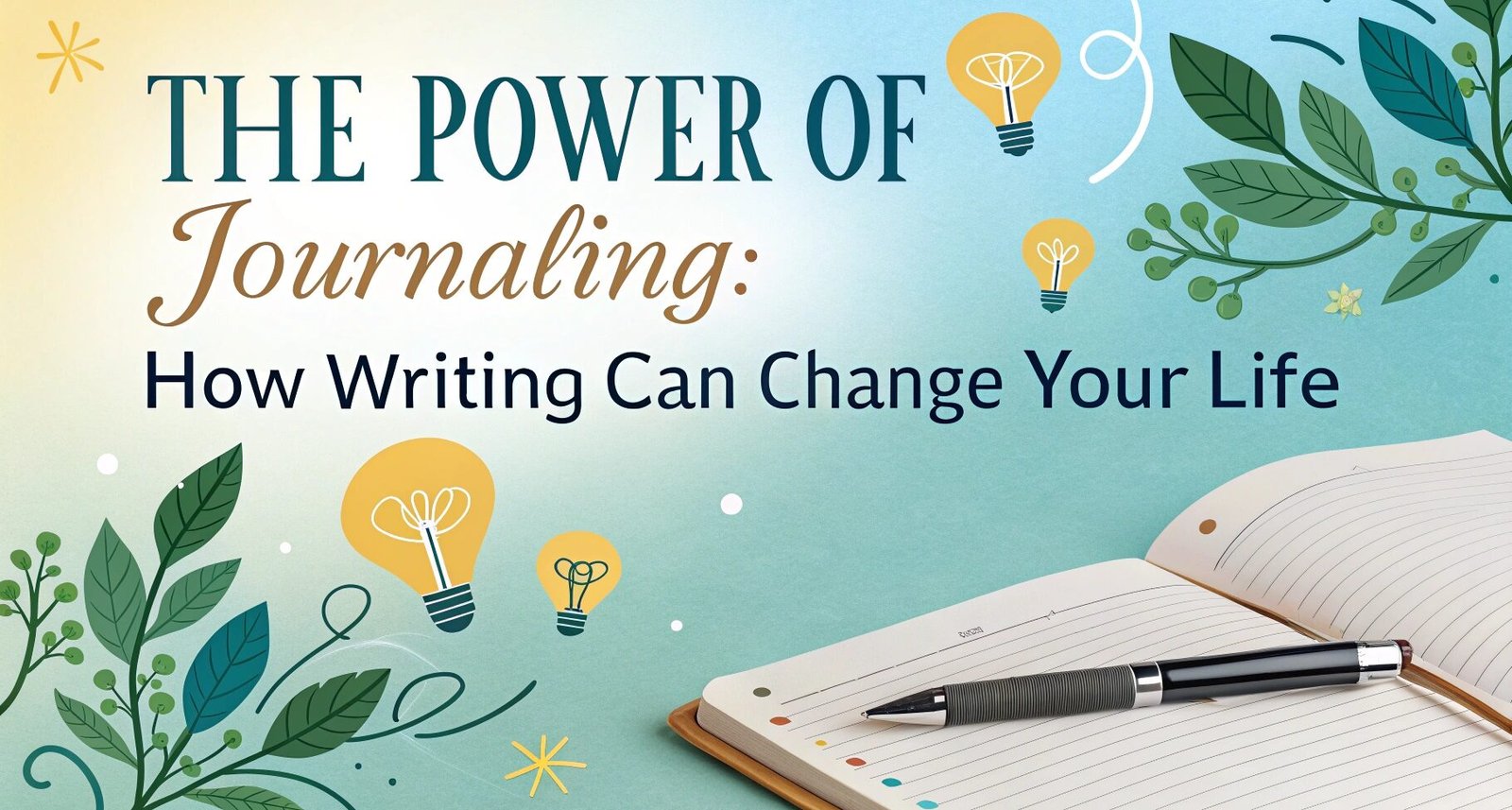Journaling: Discover How Writing Can Change Your Life

Journaling is a simple yet transformative practice that has been used for centuries to foster mental clarity and emotional well-being. By putting pen to paper, individuals can process their thoughts and feelings, gaining a deeper understanding of themselves. This mindfulness practice has been shown to have numerous journaling benefits, including reduced stress and improved mental health.

Mindfulness through journaling allows individuals to reflect on their experiences, identifying patterns and areas for personal growth. As a tool for writing for mental health, journaling provides a safe space for expression and reflection, promoting a healthier mindset.
Table of Contents
ToggleKey Takeaways
- Journaling reduces stress and improves mental health.
- Mindfulness through journaling fosters self-awareness.
- Writing for mental health is a therapeutic outlet.
- Journaling benefits include improved emotional regulation.
- Regular journaling practice can lead to personal growth.
The Power of Journaling: How Writing Can Change Your Life
Journaling has emerged as a powerful tool for personal transformation, offering a unique pathway to self-discovery and mental well-being. By committing thoughts and feelings to paper, individuals can process their experiences, gain insights into their behaviors and motivations, and develop a more compassionate relationship with themselves.
Journaling is not just a modern phenomenon; it has roots in various cultural and historical practices where writing was used for reflection, spiritual growth, and personal development. The act of writing down one’s thoughts and feelings can have a therapeutic effect, helping to clarify emotions, reduce stress, and enhance problem-solving skills.

The Science Behind Journaling and Mental Health
Research has shown that journaling can have a positive impact on mental health by reducing symptoms of anxiety and depression, improving mood, and enhancing cognitive functioning. The therapeutic benefits of journaling are thought to be linked to the process of expressive writing, which allows individuals to confront and resolve emotional challenges.
| Mental Health Benefits | Description |
|---|---|
| Reduced Anxiety | Journaling helps process emotions, reducing anxiety symptoms. |
| Improved Mood | Reflective journaling can enhance mood by focusing on positive experiences. |
Historical Perspectives on Journaling
Journaling has been a companion to many throughout history, serving as a private space for reflection, creativity, and personal growth. Historical figures like Anne Frank and Virginia Woolf used journaling as a means of expression and introspection, leaving behind valuable insights into their lives and experiences.
The practice of journaling has evolved over time, influenced by cultural, social, and technological changes. Today, journaling encompasses a wide range of practices, from trhttps://mindfulechoes06.com/wp-content/uploads/2024/02/the-two-sportsmen-greeting-outdoor-CVU6WZW-scaled-1.jpgional handwritten journals to digital platforms, offering a versatile tool for self-expression and personal development.
Getting Started: Essential Supplies and Setup for Effective Journaling
Embarking on a journaling journey requires a thoughtful approach to selecting the right tools and environment. As you begin, consider what will make your journaling practice most effective and enjoyable.
Choosing the Right Journal Format
The debate between physical and digital journaling is ongoing. Physical journals offer a tactile experience, allowing for doodles and handwritten notes. On the other hand, digital journals provide convenience, accessibility, and the ability to easily edit and organize entries. Consider your personal preference and writing habits when deciding between the two.

Creating a Conducive Environment for Writing
A clutter-free and comfortable space can significantly enhance your journaling experience. Identify a quiet spot where you can sit and write without distractions. Ensure the area is well-lit and at a comfortable temperature. By creating a dedicated space for journaling, you’ll be more inclined to maintain a consistent practice, fostering mindfulness through journaling.
As you establish your journaling routine, remember that the key to success lies in creating a habit that is both enjoyable and sustainable. By choosing the right journal format and setting up a conducive writing environment, you’ll be well on your way to developing a meaningful journaling practice.
Developing a Sustainable Journaling Habit
Consistency is key when it comes to journaling, and developing a sustainable habit is essential. To make journaling a lasting part of your routine, it’s crucial to implement strategies that foster consistency and commitment.
Setting Realistic Goals and Schedules
Setting achievable goals is vital to maintaining a journaling habit. Start by committing to a realistic schedule, such as journaling for 10 minutes each day, rather than aiming for an hour-long session that might be difficult to sustain. Flexibility is key; be prepared to adjust your schedule as needed to accommodate changes in your daily routine.
Overcoming Writer’s Block and Resistance
Writer’s block and resistance are common obstacles to maintaining a journaling habit. To overcome these challenges, try freewriting, where you write whatever comes to mind without stopping or worrying about grammar or spelling. This technique can help loosen up your writing muscles and make the process more enjoyable.
Integrating Journaling into Your Daily Routine
To make journaling a habit, integrate it into your daily routine. Consider journaling at the same time each day, such as first thing in the morning or before bed, to make it a consistent part of your daily schedule. By incorporating journaling into your daily life, you’ll be more likely to stick with it and reap the benefits of journaling for self-discovery.
By implementing these strategies, you can develop a sustainable journaling habit that brings lasting benefits to your mental and emotional well-being.
Exploring Different Journaling Techniques and Styles
The world of journaling is rich with diverse techniques, each offering unique benefits. By exploring these different methods, you can find the ones that resonate with you the most and enhance your journaling practice.
Gratitude Journaling
Gratitude journaling involves focusing on the things you are thankful for each day. This practice can help shift your perspective to a more positive one, improving mental well-being. To start, simply write down three things you are grateful for each day before you sleep.
Stream of Consciousness Writing
Stream of consciousness writing is a technique where you write continuously without stopping or worrying about grammar or spelling. This method helps to clear your mind and can be a therapeutic way to release pent-up thoughts and emotions.
Bullet Journaling for Organization
Bullet journaling is a highly structured system that uses bullet points, headings, and trackers to organize your tasks, appointments, and goals. It’s an effective way to stay organized and can be customized to fit your needs.
Reflective and Analytical Journaling
Reflective journaling involves analyzing your experiences, thoughts, and feelings to gain insights into your behaviors and patterns. This technique can help you learn from your experiences and make positive changes in your life.
| Journaling Technique | Description | Benefits |
|---|---|---|
| Gratitude Journaling | Writing down things you’re thankful for | Improves mental well-being, fosters positivity |
| Stream of Consciousness | Continuous writing without stopping | Clears the mind, releases pent-up thoughts |
| Bullet Journaling | Organized system using bullet points and trackers | Enhances organization, customizable |
| Reflective Journaling | Analyzing experiences and thoughts | Provides insights, promotes personal growth |
By incorporating these journaling techniques into your practice, you can experience the full range of benefits that journaling has to offer. Whether you choose one method or combine several, the key is to find what works best for you and make it a consistent part of your routine.
Journaling Prompts to Inspire Your Writing Practice
With the right journaling prompts, you can unlock new depths of self-awareness and personal growth. Journaling is a versatile tool that can be tailored to various needs and interests, and using prompts can help guide your writing practice.
Self-Discovery Prompts
Self-discovery prompts are designed to help you understand yourself better. Examples include: “What are your core values and how do they influence your decisions?” or “Describe a moment when you felt truly alive and happy.”
Goal-Setting and Achievement Prompts
Goal-setting prompts help you clarify your objectives and plan steps to achieve them. Try prompts like: “What are your top three goals for the next year, and what actions can you take to achieve them?” or “Reflect on a goal you achieved in the past; what skills or strengths did you use?”
Emotional Processing Prompts
Emotional processing prompts allow you to explore and understand your emotions. Use prompts such as: “Describe a recent situation that triggered strong emotions. How did you respond, and what did you learn from the experience?” or “Write about a challenging memory; how has it shaped you?”
| Prompt Type | Purpose | Example Prompts |
|---|---|---|
| Self-Discovery | Understand personal values and desires | “What makes you feel fulfilled?” |
| Goal-Setting | Plan and achieve goals | “List three steps to achieve your main goal.” |
| Emotional Processing | Explore and understand emotions | “Describe a situation that made you happy.” |
By incorporating these journaling prompts into your practice, you can enhance your self-awareness, achieve your goals, and process your emotions more effectively.
Transformative Benefits of Regular Journaling Practice
Journaling consistently can unlock a multitude of benefits that enhance overall quality of life. By committing to a regular journaling practice, individuals can experience significant improvements in their mental, emotional, and even creative facets.
Emotional Processing and Stress Reduction
One of the primary benefits of journaling is its ability to facilitate emotional processing and reduce stress. By putting thoughts and feelings into words, individuals can better understand and manage their emotions, leading to a more balanced mental state.
As noted by a renowned psychologist,
“Journaling allows individuals to process their emotions in a healthy and constructive manner.”
Enhanced Creativity and Problem-Solving
Journaling can also enhance creativity and improve problem-solving skills. The act of writing down ideas and exploring different perspectives can stimulate the mind and foster innovation.
Self-Discovery and Personal Growth
Through self-discovery, journaling enables individuals to gain a deeper understanding of themselves, their values, and their goals. This process can lead to significant personal growth and a more fulfilling life.
Improved Communication and Relationship Skills
Regular journaling can also improve communication skills by helping individuals clarify their thoughts and feelings. This, in turn, can lead to more effective and meaningful interactions with others, enhancing relationship skills.
Conclusion: Embracing the Journaling Path to Self-Transformation
Journaling is a powerful tool for self-transformation, offering a path to self-discovery and personal growth. By incorporating journaling into daily life, individuals can experience a range of benefits, from reduced stress and anxiety to enhanced creativity and problem-solving skills.
Embracing journaling as a regular practice can lead to a deeper understanding of oneself, fostering a greater sense of self-awareness and emotional intelligence. As explored in this article, various journaling techniques and styles can be tailored to suit individual needs and preferences, making it an accessible and effective means of achieving personal growth.
By starting a journaling practice, individuals can embark on a journey of self-discovery, leveraging the therapeutic benefits of writing to transform their lives. Whether through gratitude journaling, stream of consciousness writing, or other techniques, the act of journaling can be a catalyst for positive change, empowering individuals to take control of their mental and emotional well-being.
FAQ
What are the benefits of journaling for mental health?
Journaling has been shown to have a positive impact on mental health by reducing stress, anxiety, and depression. It allows individuals to process their emotions, gain clarity, and develop a greater understanding of themselves.
How do I choose the right journal for my needs?
Choosing the right journal depends on personal preference. Consider whether you prefer a physical or digital journal, the size and layout, and any additional features such as prompts or inspirational quotes.
What is the best way to start a journaling practice?
To start a journaling practice, begin by setting aside a dedicated time and space to write. Start with a simple prompt or simply write down your thoughts and feelings. Be consistent and make journaling a habit.
How can I overcome writer’s block when journaling?
To overcome writer’s block, try changing your environment, using different writing tools, or switching to a different journaling technique such as drawing or collaging. You can also use prompts or freewriting exercises to get started.
Can journaling help with goal-setting and achievement?
Yes, journaling can be a powerful tool for goal-setting and achievement. By writing down your goals and tracking your progress, you can clarify your objectives, identify obstacles, and develop a plan to achieve success.
How can I incorporate journaling into my daily routine?
To incorporate journaling into your daily routine, try setting a specific time and place to journal each day, such as first thing in the morning or before bed. You can also combine journaling with other daily activities, such as meditation or exercise.
What are some different journaling techniques I can try?
There are many different journaling techniques to try, including gratitude journaling, stream of consciousness writing, bullet journaling, and reflective journaling. Experiment with different techniques to find what works best for you.
Can journaling help with emotional processing and stress reduction?
Yes, journaling can be a helpful tool for emotional processing and stress reduction. By writing down your thoughts and feelings, you can process and release emotions, gain clarity, and develop a greater sense of calm and well-being.

